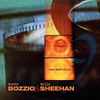Klaus Schulze has been described as one of the few electronic composers to put feeling into essentially dead machines and Blackdance proves that to be true. ("Luton Herald"/England, August 23rd, 1974) Klaus Schulze has most definitely proved over and over again that the above statement is true. His ability to transport the listener to wherever the imagination will take him or her, is unparalleled. Blackdance, originally released in 1974, is part of Klaus's "Virgin Years" and a perfect example of this. Along with Timewind, this music stands apart from anything else his imitators may have done and are true masterpieces of electronic music. This definitive version of Blackdance comes housed in digipak format with an enhanced book and contains two bonus tracks.
Klaus Schulze explains: "Blackdance was my first album to be released in England on Caroline, a Virgin label. Before that [Virgin boss] Richard Branson had signed Tangerine Dream, and then he also contacted me. Of course, I said yes right away. Not just because Branson liked music from Germany but also since Virgin was at the time, apart from Island Records, the prestigious English record company. For Voices of Syn (the longest piece on Blackdance), I used the voice of Ernst Walter Siemon. He was an opera singer who had rehearsed at the studio in Berlin where we had recorded the first Tangerine Dream record Electronic Meditation [1970]. I happened to be there and asked him whether he wanted to sing something for me and he did a little collage for me that consisted of Verdi and a few other composers. I recorded it on my Revox tape machine and used it for this intro a few years later. I played 12-string guitar on Blackdance myself, since I started with the acoustic guitar, before I played drums. At the time, I had been in New York and I bought a Martin 12-string at Manny's Music Store because it sounded so unbelievably wonderful. I thought I definitely had to use that sound in a song somewhere but after I had completed Blackdance I found this thing with the guitar and congas and tablas not that great anymore. It sounded too much like folk to me. On the other hand many people have told me that it was actually this sound which drew their attention to my music. For instance, Steven Wilson of Porcupine Tree told me this recently. He thinks Blackdance is a fantastic album."
"I can't quite exactly remember the details of the bonus tracks. I think they originated at the The Manor Studio, owned by Virgin, back in 1975 where I produced the Far East Family Band [with Masanori Takahashi, aka Kitaro] and it was possibly during a break when the guys were asleep. But I can't swear to it. There are an incredible amount of tapes which I have filled with music, which are temporarily stored until [Klaus Dieter] Müller digs them out again. When somebody asks me thirty years later, when, where and how I did one of these pieces, for me it's just like someone investigating a tax offence, "We have a receipt here from the petrol station. Where did you get petrol on August 7th 1997?" When even Müller doesn't know exactly when and where I did a piece of music, then no-one knows!"
Klaus Schulze first attracted attention as a member of the German progressive rock band, Tangerine Dream. Following the release of their debut LP, Electronic Meditation, he departed for a solo career. Klaus' recorded work typically features extended pieces sometimes filling an entire album built around computer-generated synthesizers and other specially programmed electronic effects. Klaus Schulze remains a cult figure in the United States, where the bulk of his prolific output has until now been available only through the import bins. He is widely considered an avant-garde mainstay as well as a founding father of both the new-age space music and electronica genres.
 7 comments
7 comments 7 comments
7 comments Curse of the Music Diary (2025) (1192 music items)
Curse of the Music Diary (2025) (1192 music items) Login
Login









